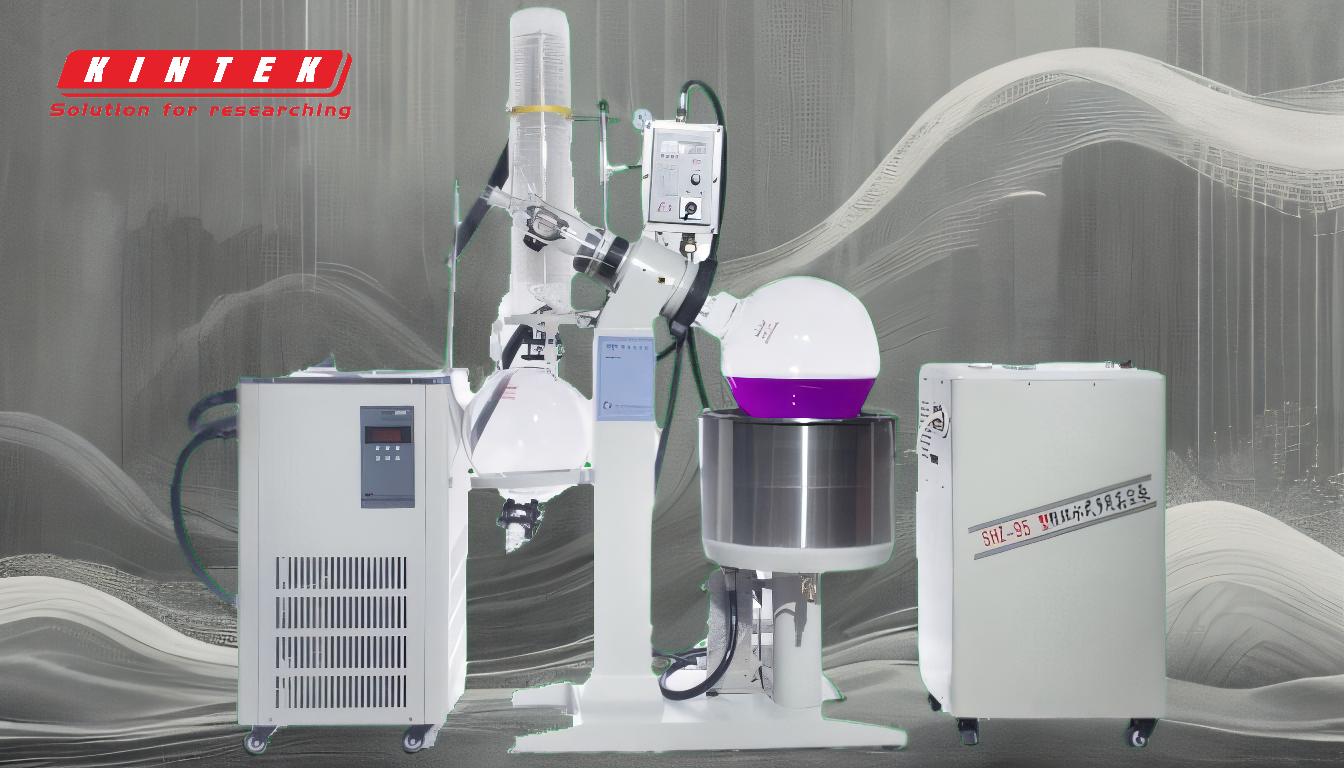Distillation is a versatile separation technique widely used across various industries due to its ability to purify, separate, and concentrate substances based on differences in their boiling points. It is employed in applications ranging from water purification and oil stabilization to the production of pharmaceuticals, fragrances, and alcoholic beverages. Distillation techniques like short path distillation and wiped film distillation are particularly valuable for processing heat-sensitive and high-viscosity materials, ensuring high purity and minimal waste. Industries such as pharmaceuticals, petrochemicals, food processing, and biotechnology rely on distillation for efficient and precise separation processes, making it a cornerstone of modern industrial and laboratory operations.
Key Points Explained:

-
Water Purification and Desalination:
- Distillation is a key method for producing purified water, especially in desalination processes where seawater is converted into drinking water.
- Distilled water is also used in lead-acid batteries and low-volume humidifiers, where purity is essential for optimal performance.
-
Production of Alcoholic Beverages:
- Distillation is critical in the production of spirits like whiskey, vodka, and rum. It separates alcohol from fermented mixtures, concentrating the desired compounds and removing impurities.
- This process ensures the final product meets quality and safety standards.
-
Fragrance and Flavor Extraction:
- Perfumes and food flavorings are often derived from herbs, flowers, and plants through distillation. This technique extracts essential oils and aromatic compounds, preserving their natural properties.
- The process is widely used in the fragrance and food industries to create high-quality, natural products.
-
Oil Stabilization and Petrochemical Applications:
- In the petroleum industry, distillation is used for oil stabilization, which reduces the vapor pressure of crude oil, making it safer for storage and transportation.
- Distillation also plays a role in refining crude oil into usable products like gasoline, diesel, and jet fuel.
-
Air Separation via Cryogenic Distillation:
- Cryogenic distillation separates air into its primary components—nitrogen, oxygen, and argon. These gases are essential for industrial processes, medical applications, and scientific research.
- This technique is vital for producing high-purity gases used in welding, steelmaking, and healthcare.
-
Pharmaceutical and Nutraceutical Industries:
- Short path distillation is widely used in pharmaceuticals and nutraceuticals to purify high molecular weight organic compounds, such as active pharmaceutical ingredients (APIs) and dietary supplements.
- This method ensures high purity and minimizes thermal degradation, making it ideal for heat-sensitive materials.
-
Chemical Synthesis and Industrial Purification:
- Distillation is a cornerstone of chemical manufacturing, used to purify liquid products obtained from chemical synthesis.
- It ensures that the final products meet stringent quality standards, making it indispensable in industries like specialty chemicals and polymers.
-
Food Processing and Essential Oils:
- Distillation is used to extract and concentrate essential oils from plants, which are then used in food flavorings, aromatherapy, and cosmetics.
- It is also employed in food processing to remove impurities and concentrate desirable components, such as in the production of edible oils.
-
Wiped Film Distillation for High-Viscosity Materials:
- Wiped film distillation is particularly useful for processing high-viscosity and heat-sensitive materials, such as polymers, resins, and certain chemicals.
- It reduces operating temperatures and pressures, increases evaporation rates, and shortens residence time, making it ideal for industries like biotechnology and nuclear.
-
Cannabidiol (CBD) and Essential Oil Production:
- Short path distillation is widely used in the extraction and purification of cannabidiol (CBD) and other cannabinoids from cannabis plants.
- This method ensures high purity and potency, meeting the demands of the rapidly growing CBD market.
-
Laboratory and Research Applications:
- Distillation is a fundamental technique in chemistry labs for isolating and purifying compounds during research and development.
- It is also used in perfume labs and other specialized research facilities to create high-purity samples for analysis.
In summary, distillation is a foundational separation technique with applications spanning water purification, food and beverage production, pharmaceuticals, petrochemicals, and more. Its ability to efficiently separate and purify substances makes it indispensable across a wide range of industries, ensuring the production of high-quality, safe, and effective products.
Summary Table:
| Industry | Key Applications |
|---|---|
| Water Purification | Desalination, distilled water for batteries and humidifiers |
| Alcoholic Beverages | Production of spirits like whiskey, vodka, and rum |
| Fragrance & Flavor | Extraction of essential oils and aromatic compounds |
| Petrochemicals | Oil stabilization, refining crude oil into gasoline, diesel, and jet fuel |
| Air Separation | Cryogenic distillation for nitrogen, oxygen, and argon production |
| Pharmaceuticals | Purification of APIs and dietary supplements using short path distillation |
| Chemical Synthesis | Purification of liquid products in chemical manufacturing |
| Food Processing | Extraction of essential oils and edible oil production |
| Biotechnology | Wiped film distillation for high-viscosity and heat-sensitive materials |
| CBD Production | Extraction and purification of cannabidiol (CBD) and cannabinoids |
| Laboratory Research | Isolation and purification of compounds for analysis and development |
Discover how distillation can optimize your processes—contact our experts today!










